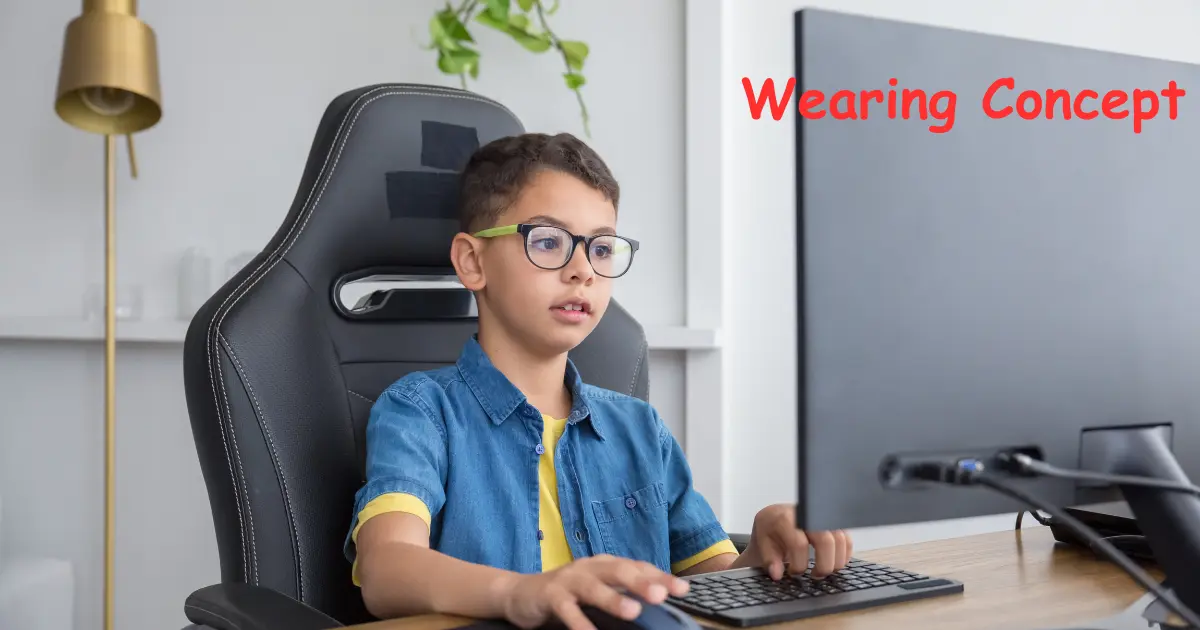When using computers for extended periods, the question of whether to wear glasses or contacts often arises. With the growing prevalence of digital screens in our daily lives, understanding the best option for eye health is crucial. This article will explore the advantages and disadvantages of glasses and contacts while using a computer, supported by scientific research and expert opinions.
What Is Digital Eye Strain?

Digital Eye Strain (DES), also known as Computer Vision Syndrome (CVS), refers to a group of eye and vision-related problems that result from prolonged computer use. Symptoms of DES include:
- Eye discomfort
- Dry eyes
- Headaches
- Blurred vision
- Neck and shoulder pain
Causes of Digital Eye Strain
The primary causes of DES include:
- Extended screen time without breaks
- Poor lighting conditions
- Glare on the screen
- Incorrect viewing distances
- Uncorrected vision problems
How Does Blue Light Affect the Eyes?
Blue light is a high-energy visible light with shorter wavelengths. It is emitted by digital screens, LED lighting, and the sun. While blue light during the day helps regulate our sleep-wake cycle, excessive exposure, especially at night, can disrupt sleep patterns and contribute to digital eye strain.
Blue Light and Eye Health
Prolonged exposure to blue light can lead to:
- Digital eye strain
- Disrupted sleep patterns
- Potential damage to the retina over time
Glasses vs. Contacts: Pros and Cons
Pros:
- Blue Light Protection: Many glasses come with blue light-blocking coatings that help reduce eye strain.
- Ease of Use: Glasses are easy to put on and take off.
- Less Irritation: No direct contact with the eyes reduces the risk of irritation or infection.
Cons:
- Comfort Issues: Wearing glasses for extended periods can be uncomfortable, especially with headphones.
- Limited Field of View: Glasses may not provide the same peripheral vision as contacts.
Contacts
Pros:
- Natural Vision: Contacts offer a more natural field of view without the frame obstruction.
- Comfort: For some, contacts are more comfortable, especially for active individuals.
- No Glare: Contacts do not reflect light, which can reduce glare from screens.
Cons:
- Blue Light Protection: Most contact lenses do not have blue light-blocking capabilities.
- Eye Irritation: Prolonged use of contacts can cause dryness and irritation, especially in front of a screen.
Factors to Consider
When deciding between glasses and contacts for computer use, consider the following factors:
- Duration of Screen Time: Long hours may require blue light protection.
- Comfort: Personal comfort varies; try both options to see which works best.
- Eye Health: Those prone to dry eyes or infections may prefer glasses.
- Prescription: Ensure your prescription is up-to-date for optimal vision correction.
- Lifestyle: Consider your daily activities and which option suits them better.
What Is Digital Eye Strain?
Digital Eye Strain (DES) is a group of vision-related issues caused by prolonged use of digital devices. Symptoms include eye discomfort, dry eyes, headaches, and blurred vision. It results from extended screen time, poor lighting, screen glare, incorrect viewing distances, and uncorrected vision problems.
How Does Blue Light Affect the Eyes?

Blue light, emitted by screens and LED lighting, can lead to digital eye strain and disrupt sleep patterns. While beneficial during the day for regulating sleep-wake cycles, excessive exposure, especially at night, may cause retinal damage over time.
Are Blue Light Glasses Effective?
Yes, blue light glasses can reduce eye strain and improve sleep quality by filtering out blue light from screens. They are particularly beneficial for those who spend long hours in front of a computer or other digital devices.
Can Contact Lenses Protect Against Blue Light?
Most contact lenses do not have blue light-blocking capabilities. However, some brands are starting to offer contacts with blue light protection. It’s important to consult with an eye care professional to find the best solution.
Which Is More Comfortable: Glasses or Contacts?
Comfort is subjective and varies from person to person. Glasses may be more comfortable for those who experience dryness or irritation with contacts, while others may prefer the natural vision and freedom from frames that contacts provide.
Comparison of Glasses and Contacts for Computer Use
| Feature | Glasses | Contacts |
|---|---|---|
| Blue Light Protection | Often included | Rarely included |
| Ease of Use | Easy to wear and remove | Requires proper hygiene practices |
| Comfort | May be uncomfortable for long wear | Generally more comfortable |
| Field of View | Limited by frame | Natural, unobstructed view |
| Risk of Eye Irritation | Low | Higher, especially with prolonged use |
| Glare | Potential issue | No glare |
Conclusion
When it comes to choosing between glasses and contacts for computer use, there is no one-size-fits-all answer. Both options have their own set of advantages and disadvantages. Glasses, especially those with blue light-blocking lenses, are effective in reducing digital eye strain and are easy to use. They are also less likely to cause eye irritation compared to contacts. However, they may not be as comfortable for prolonged wear, particularly if you also wear headphones or headsets.
Contacts provide a wider field of view and a more natural visual experience, which can be beneficial for activities that require peripheral vision. They also eliminate issues related to glare from screens. However, contacts do not typically offer blue light protection, and wearing them for extended periods, especially in front of a computer, can lead to dryness and irritation.
Ultimately, the decision should be based on individual needs and preferences. For those who spend a significant amount of time in front of screens, investing in blue light-blocking glasses or contacts with blue light protection can be a wise choice. Regular breaks, proper lighting, and maintaining an appropriate distance from the screen are also crucial steps in reducing digital eye strain.
FAQs
Here are some frequently asked questions given below:
Is it safe to wear contact lenses while using a computer?
Yes, it is safe to wear contact lenses while using a computer, but it is important to follow proper hygiene practices and take regular breaks to prevent dryness and irritation.
Can I wear blue light glasses over my contact lenses?
Yes, you can wear blue light glasses over your contact lenses to provide additional protection against blue light emitted from screens.
How can I reduce eye strain while using a computer?
To reduce eye strain, follow the 20-20-20 rule: every 20 minutes, take a 20-second break and look at something 20 feet away. Additionally, adjust your screen’s brightness, reduce glare, and ensure proper lighting in your workspace.
Are there contact lenses designed for computer use?
Some brands offer contact lenses with blue light-filtering technology designed to reduce digital eye strain. Consult with an eye care professional to explore available options.
What are the signs that I need a new prescription for my glasses or contacts?
Signs that you may need a new prescription include frequent headaches, blurred vision, eye strain, and difficulty focusing on objects. Regular eye exams are essential to ensure your prescription is up-to-date.
